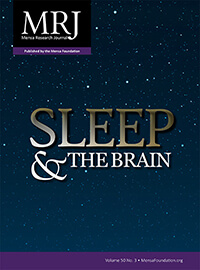“Happiness consists of getting enough sleep. Just that, nothing more.” —Robert A. Heinlein
“The amount of sleep required by the average person is five minutes more.” —Wilson Mizener
From Plato to present time, authors, actors, and activists, or anyone with an opinion … quotes on sleep abound. In general, many of us spend about one-third of our life sleeping. Whether you are an insomniac or a napper, sleep is a universal aspect for all of us.
In the latest issue of the Mensa Research Journal, we attempt to unravel the mysteries of sleep and its effect on the brain through the work of a selection of researchers. Our first article explores how sleep deprivation affects attention and cognitive control, in particular top-down processing (e.g., requiring sustained attention) relative to bottom-up or more automatic processing.
Although not a research article, I chose the second article because of its proposed framework of how sleep spindles and their characteristics play a role in memory reprocessing and consolidation. Although asking questions rather than presenting answers, it provides a bit of overview that segues to the research articles on sleep spindles that follow.
Sleep spindles occur during non-rapid eye movement (NREM) sleep, and are usually described as a series of neural oscillations. Their significance related to various brain functions provides fodder for a variety of research. How do they affect cognitive ability or memory consolidation (short- and long-term)? What changes, if any, occur from adolescence to adulthood? This issue includes a collection of research articles that seek to find answers to these questions.
My favorite articles, with a topic of napping, are the last two in this issue. Turns out that napping for older adults benefits working memory. I also learned there is a difference in nap outcomes between those people who regularly nap and those who don’t. And, I’m happy to have research evidence to justify my naps. Check them out for more information.
* * *
In closing, I want to say thank you to Steve Slepner. He did a fine job selecting themes and articles to bring the latest information about intelligence to the MRJ’s intelligent readers. The Foundation thanks him and appreciates his service as MRJ editor.
Published three times yearly, the Mensa Research Journal highlights scholarly articles and recent research related to intelligence from a diverse selection of nationally and internationally esteemed authors. Learn more about the MRJ and subscribe today.
Research featured in this issue
- “Sleep deprivation differentially affects subcomponents of cognitive control,” by Anikó Kusztor, Liisa Raud, Bjørn E. Juel, André S. Nilsen, Johan F. Storm, and Rene J. Huster (Sleep, Vol. 42, Issue 4)
- “Sleep Spindles and Memory Reprocessing,” by James W. Antony, Monika Schönauer, Bernhard P. Staresina, and Scott A. Cairney (Trends in Neurosciences, Vol. 42, Issue 1)
- “Brain Activation Time-Locked to Sleep Spindles Associated With Human Cognitive Abilities,” by Zhuo Fang, Laura B. Ray, Adrian M. Owen, and Stuart M. Fogel (Frontiers in Neuroscience, Vol. 13)
- “Developmental Changes of Sleep Spindles and Their Impact on Sleep-Dependent Memory Consolidation and General Cognitive Abilities: A Longitudinal Approach,” by Michael Hahn, Ann-Kathrin Joechner, Judith Roell, Manuel Schabus, Dominik PJ Heib, Georg Gruber, Philippe Peigneux, and Kerstin Hoedlmoser (Developmental Science, Vol. 22, Issue 1)
- “Coupling of autonomic and central events during sleep benefits declarative memory consolidation,” by Mohsen Naji, Giri P. Krishnan, Elizabeth A. McDevitt, Maxim Bazhenov, and Sara C. Mednick (Neurobiology of Learning and Memory, Vol. 157)
- “Does working memory improvement benefit from sleep in older adults?” by Negin Sattari, Lauren N. Whitehurst, Maryam Ahmadia, and Sara C. Mednick (Neurobiology of Sleep and Circadian Rhythms, Vol. 6)
- “The impact of frequent napping and nap practice on sleep-dependent memory in humans,” by Elizabeth A. McDevitt, Negin Sattari, Katherine A. Duggan, Nicola Cellini, Lauren N. Whitehurst, Chalani Perera, Nicholas Reihanabad, Samantha Granados, Lexus Hernandez, and Sara C. Mednick (Scientific Reports, Vol. 8)











Comments (0)